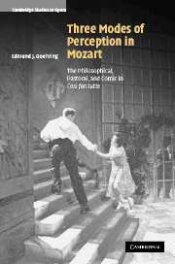Così fan tutte has been studied extensively, despite the broad assertion stated in the book. What the author of this study brings to the reader, which others have not, is a detailed examination of the philosophical, pastoral, and comic background of the libretto, characters, and music of the opera. New perspectives on text and tone in the opera, the subtle use of the pastoral mode, and the tension and balance between philosophy and comedy are what the author brings to the study of this work. In addition, the author does an intensely close reading of the primary sources of the opera, in order to support his theories and statements.
The book is divided into four major sections. Chapter 1 looks at the poetics of Così fan tutte, examining the history of the word/music relations in the opera, then in relation to postmodern poetics, and the reception of the opera itself in the eighteenth century. The author then puts forward his hypothesis that, rather than continue the long-standing tradition of the musical and textual incompatibility of the opera, he will prove that this rift between text and music is a distinctive and indeed important union that is unparalleled in any other Mozart opera. To illustrate this, some portions of recitative contained in the opera, as well as the overture and the song "Tutti accusan le donne," are provided with explanation and as musical examples.
Chapter 2 examines the philosophical mode of Così fan tutte. The author specifically focuses on the character of Don Alfonso, discussing his various aspects and attributes that appear throughout the opera, including the old man, poet, cynic, and comic philosopher. The author relates these archetypes to various eighteenth-century readings, concepts, and popular understandings at the time of the opera. Other philosopher-type characters in eighteenth-century operas are mentioned, Paisiello's Il Socrate immaginario in particular.
The pastoral mode of the opera, along with the character of Despina, comprises the content of Chapter 3. Here, the author examines Despina's musical and textual authority, discusses the theory and practice of the pastoral mode, how the pastoral setting was sentimentalized in the eighteenth century, and links to Epicureanism. Specific Despina musical numbers, such as "In uomini, in soldati" and "Una donna a quindici anni," are provided with in-depth analysis and commentary.
The comic mode in Così fan tutte is the topic of Chapter 4. Various characters in the opera fit into the sentimental comedian role, such as Don Alfonso, Fiordiligi, and Ferrando. The origins of sentimental comedy are discussed, and this opera as anti-sentimental opera is presented. Some interesting research on heroic and martial images of love in the soldiers, and the seduction duets, is provided.
Finally, in the epilogue, the author points out that Così fan tutte, as an artificial comedy, enjoyed a brief period of popularity before it lost favor with the opera-going public, especially in the nineteenth century. It is an opera that looked back to older theatrical and operatic traditions for inspiration, and therefore never really found a place in the oeuvre, nor in the favor of the opera-going public. Overall, this is a well-documented and researched scholarly study of Mozart's least-understood opera.
Dr. Brad Eden
University of Nevada, Las Vegas
